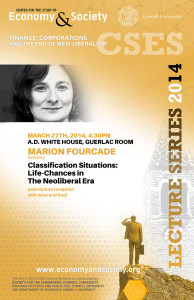Classification Situations: Life-Chances in the Neoliberal Era by Marion Fourcade
We are pleased to present our CSES Lecture Series on March 27th, 2014 at Cornell University from 4:30 to 6PM in the A.D. White House, Guerlac Room. Marion Fourcade presented her research “Classification Situations: Life-Chances in the Neoliberal Era.”
Abstract
This article examines the stratifying effects of economic classifications. We argue that in the neoliberal era market institutions increasingly use actuarial techniques to split and sort individuals into classification situations that shape life-chances. While this is a general and increasingly pervasive process, our main empirical illustration comes from the transformation of the credit market in the United States. This market works as both as a leveling force and as a condenser of new forms of social difference. The U.S. banking and credit system has greatly broadened its scope over the past twenty years to incorporate previously excluded groups. We observe this leveling tendency in the expansion of credit amongst lower-income households, the systematization of overdraft protections, and the unexpected and rapid growth of the fringe banking sector. But while access to credit has democratized, it has also differentiated. Scoring technologies classify and price people according to credit risk. This has allowed multiple new distinctions to be made amongst the creditworthy, as scores get attached to different interest rates and loan structures. Scores have also expanded into markets beyond consumer credit, such as insurance, real estate, employment, and elsewhere. The result is a cumulative pattern of advantage and disadvantage with both objectively measured and subjectively experienced aspects. We argue these private classificatory tools are increasingly central to the generation of “market-situations”, and thus an important and overlooked force that structures individual life-chances. In short, classification situations may have become the engine of modern class situations.
About the Speaker
Marion Fourcade received her PhD from Harvard University (2000) and taught at New York University and Princeton University before joining the Berkeley sociology department in 2003. A comparative sociologist by training and taste, she is interested in variations in economic and political knowledge and practice across nations. Her first book, Economists and Societies (Princeton University Press 2009), explored the distinctive character of the discipline and profession of economics in three countries. She is now working on a second book, tentatively called Measure for Measure: Social Ontologies of Classification, which examines the cultural and institutional logic of what we may call “national classificatory styles” across a range of empirical domains. Current studies for this book include environmental valuation, the digitization of books and the classification of wines in France and the United States. Other ongoing research focuses on the role of the credit market in social stratification (with Kieran Healy); the comparative study of political organization (with Evan Schofer and Brian Lande); the microsociology of courtroom exchanges (with Roi Livne); and the role of business schools in the neoliberal turn (with Rakesh Khurana).


